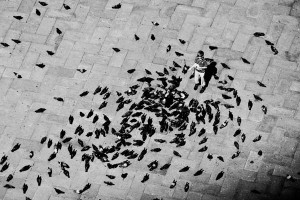Man. These readings were great. I have enjoyed everything about this class, but these readings (and hopefully, this week’s discussions) are particularly excellent.
Algernon, the rats of NIMH, and other rodents as humans
Rats are like humans, says Burt (from this week’s readings).
When I was a young teenager, I was fascinated with books about the humanity and intelligence of rodents. You will have to forgive me while I write meanderingly about some of these books. Three books that made particularly big impressions on me were Mrs. Frisby and the Rats of NIMH, Flowers for Algernon, and The Amazing Maurice and his Educated Rodents. A main theme in all of these books is the similarity of rodents to humans.
Mrs. Frisby and The Amazing Maurice are similar in that they describe human-like populations of sentient rodents. Both are YA fiction and both make make rats and mice seem very human. Interestingly, it seems that is really much easier to write compelling about human-like rodent civilizations than it is to write about human like civilizations of other species, like horses, dogs, or cats. Rats exist in a different realm than we do, but a parallel realm. We don’t really know what rodents do in the sewers or the walls, we just know that they do something. They are there, they survive, they reproduce. We have this sense that they could have human-like civilizations down there.
There is this sense, at the end of both novels, that these rodent populations are struggling against some formidable evil and that they will eventually, inevitably fall. And then, so will we.
Flowers for Algernon is different than Mrs Frisby and The Amazing Maurice in that it doesn’t describe a population of human-like rodents. In Flowers for Algernon, Charlie Gordon realizes what his fate will be when he sees the fate of the mouse (Algernon) which underwent the medical procedure that he underwent. Again, rodents are us, and we are them, but this time much more obviously. Charlie’s fate is Algernon’s fate.
Rodents survive anywhere we survive. We cannot rid ourselves of them. If rodents were wiped out, so would we be wiped out. Like us, rodents are omnivores and are opportunists.
“The rat is a clean animal living in the middle of filth, a cunning and intelligent creature of no discernible use, a parasite rather than a producer,” writes Burt. Is that not as true of humans as it is true of rats? Culvier, who classified the animal kingdom in 1817 said that rats have an “extraordinary capacity for destruction disproportionate to their size” (Burt). Is this not also true of humans?
The mouse as a lab animal
Wow. Before DNA had been identified as the genetic material, people were already doing complex studies to determine whether cancer had a genetic component. To do this, they were using the mouse as a human model. Again, mice as humans. If this medication will cure mouse cancer, we say, it should cure human cancer.
Our distaste for mice and rats has made it very easy to make them subject of our (perhaps cruel) scientific experiments.Don’t get me wrong. I support animal research more than your average American. I’m going to do research on animal when I grow up. Also, most of us are alive due to animal research. But, we must admit that it is sometime cruel. Intrntionally breeding mice that will inevitably die of cancer is cruel. Necessary? yes. Highly useful? yes. But also cruel. I’m not here to discuss the ethics of animal research, however.
Mice came to be a staple model animal because of one researcher, Little, who bred a strain of inbred “oncomice” and because of the American anti-cancer movement. Without Little, what would research look like? How different would it be?
Names: animal as individuals and as objects
Names impart human characteristics. Apparently, there is some evidence that dolphins call each other by name, but (as far as I know) few (if any) other species do. By giving something a name, we are giving it a small piece of our own humanity. We are saying “you are one of us.” Of course laboratory animals are not named, just as meat animals are not named. Once we have named an animal, we have in a way, “humanized” it, and then we couldn’t use it as if it were an object, rather than a living thing.
When we consider laboratory animals, just as with meat animals, we don’t want to consider the idea that animals we use could be anything like us.
Is this wrong? I don’t really know, honestly. If we first say that the use (as food or as a model) of the animal is necessary and further we say that people must be involved in the maintenance of the animal, then these people must somehow get around the fact that the animals for which they care every day will eventually die. This is very possible. We become affectionate selectively in our lives with good reason. If I cared for every person I met as much as I care for my brother, I would not be able to function. Similarly, if I cared for every animal as much as I care for my pony, I would always be filled with despair.
Finally, I’m going to go ahead and say that I’m with Shapiro on the lack of necessity of laboratory animals in psychology. Why are we modeling psychological conditions in something as different than a human as a rat? Medical conditions, yes. I get that. Our physiological systems aren’t tremendously different that those of a rat. Our mental systems, however, are very different and the use of a rat model seems generally irresponsible (not in every case, obviously. But in many, if not most cases).

